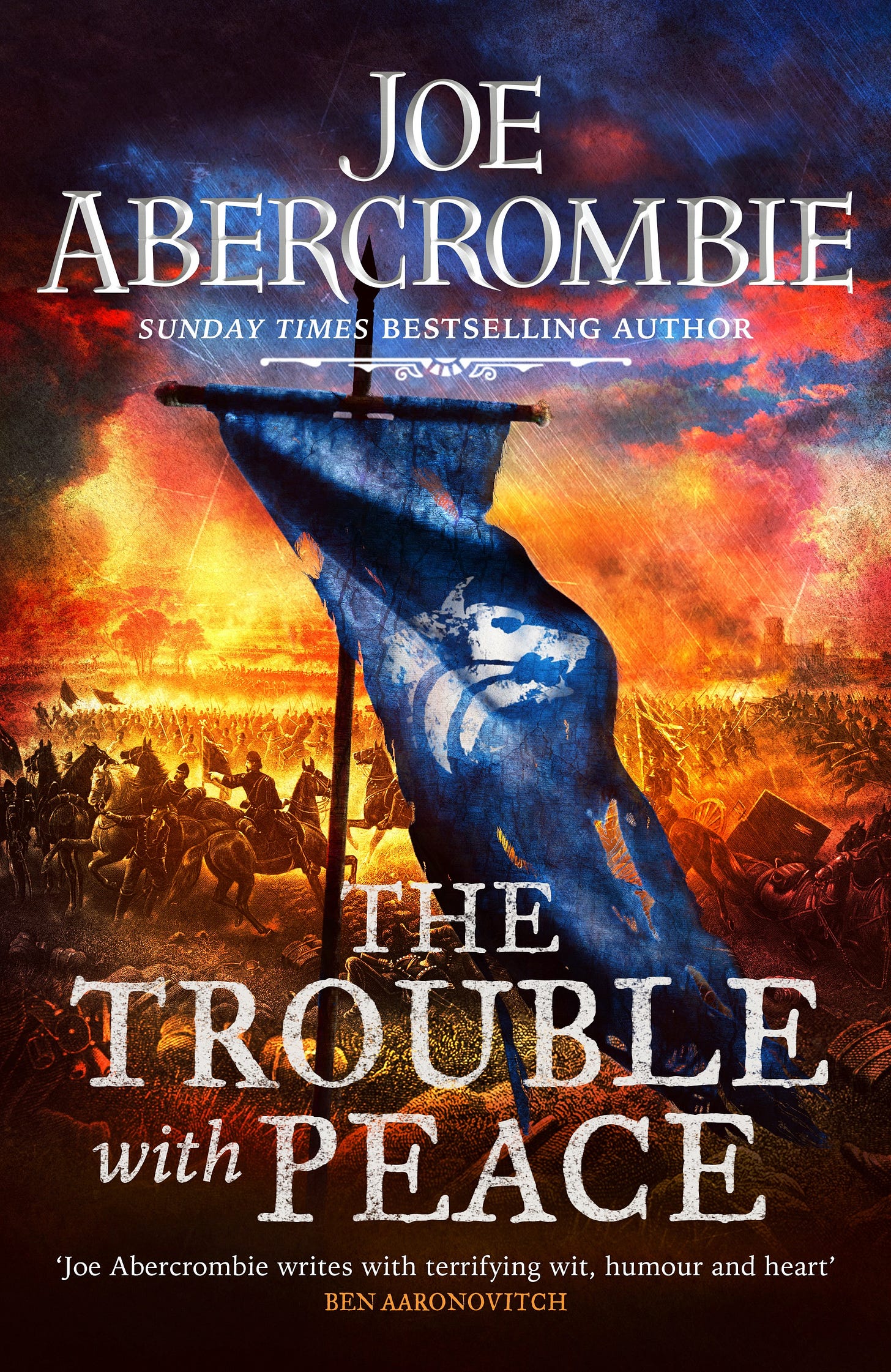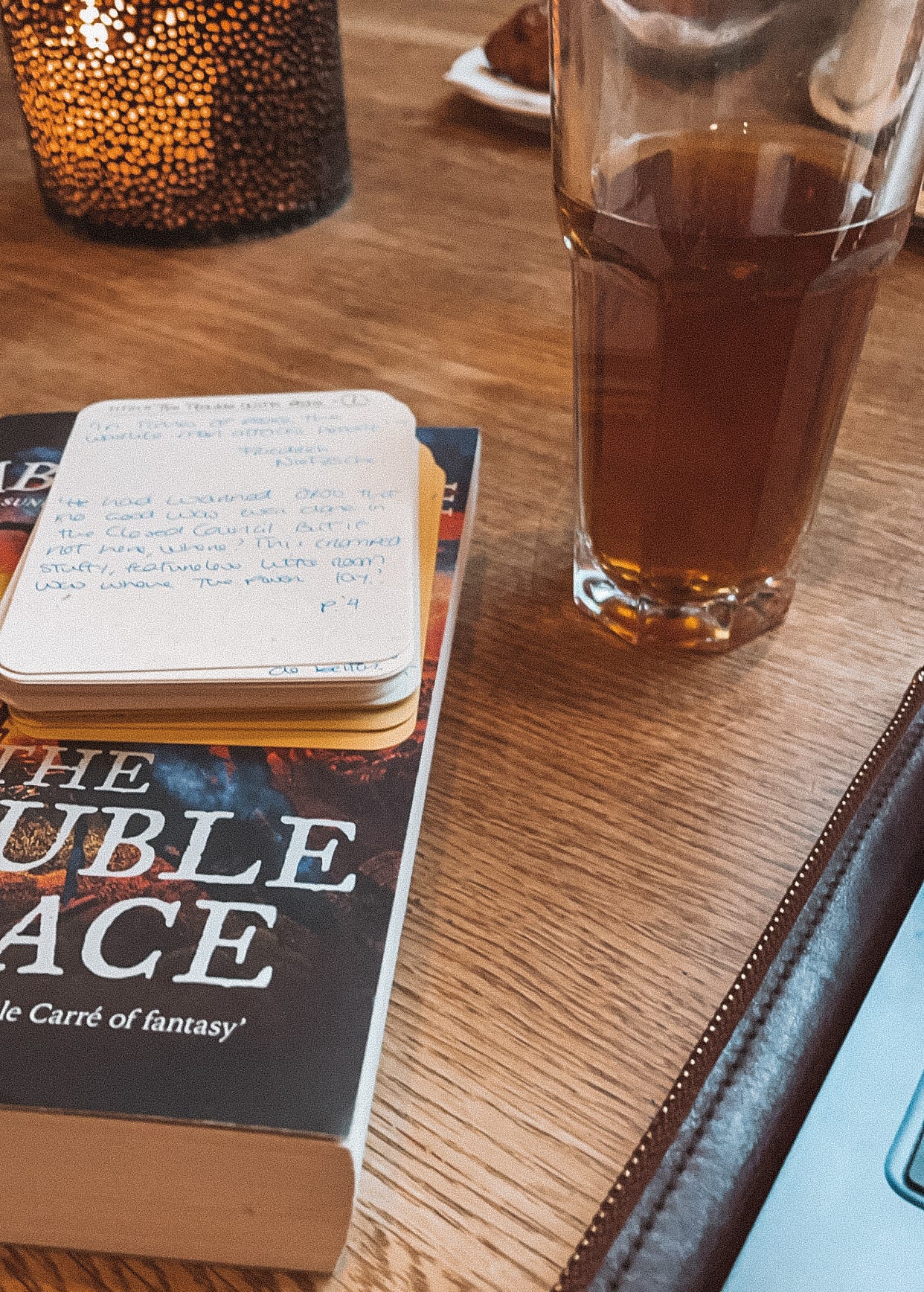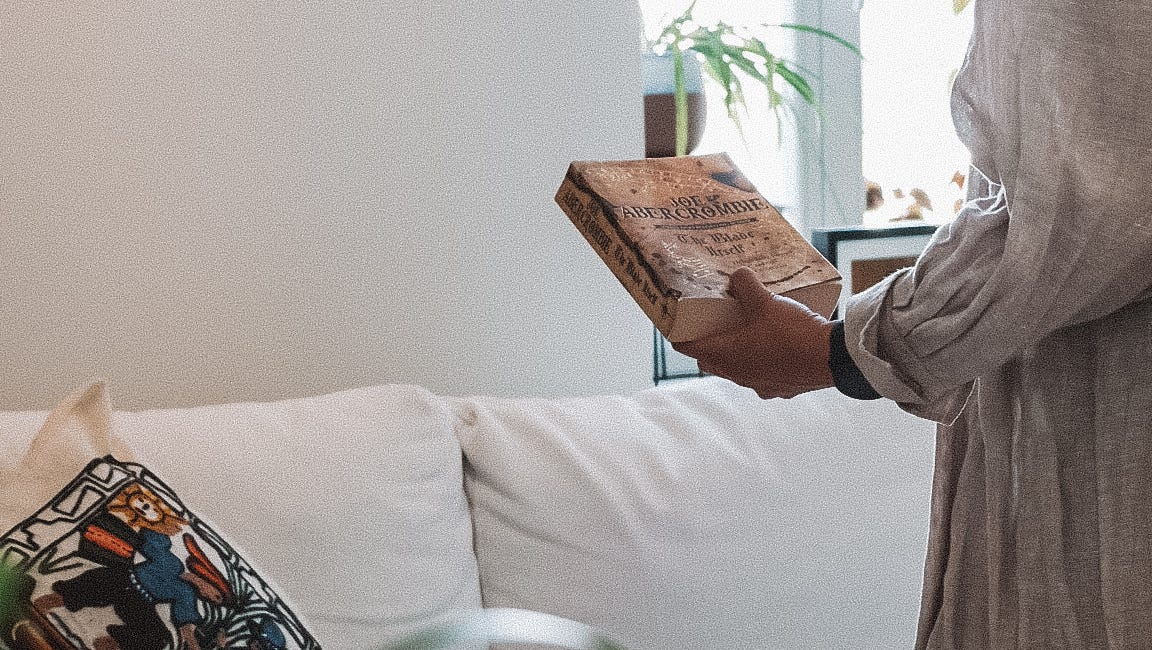Peace is just another kind of battlefield
Nietzsche said «In times of peace the warlike man attacks himself» and nothing rings more true for this book than this quote.
It never ceases to amaze me how much fantasy can be a commentary on our own reality. I might be in a world where there is chaos, rebellions looming, gritty realities, morally grey characters and magic - and then it just hits you. A commentary that could very well be about our own realities. Different wrapping - but a message that resonates.
The Trouble With Peace reads for me as a book with so many hard hitting truths about our society. Truths that it likes to point and poke at with a crooked finger. In many ways, especially these days, one could argue that we are in fact living in our own age of madness.
The Trouble with Peace is the second book of the trilogy The Age of Madness by Joe Abercrombie, it picks up right after the events of A Little Hatred, and it is by no means a slow second book. We are thrown right into it! Peace as it turns out, never really lasts that long. Where the first book was focused on war, glory and a brewing rebellion, this book is so much more about the politics, the plotting behind closed doors as well as ambitions, manipulation and the rebellion.
Even stupidity has its moments in this one.
As all Abercrombie books the characters and the sharp dialogue are the main event of the story. He has, however, truly upped his game when it comes to world building and the scheming in The Trouble With Peace. Put it all together with his grim dark humour and amazing storytelling, you have a five star read right in your hands.
I ended up with a hefty bunch of notecards after finishing this book, I even had to reread the book before I was able to actually sit down and write this review. All this, to truly let it sink in. There were simply so many amazing quotes, scenes and moments that stood out to me. I won’t be able to list them all up here, but trust me when I say this book is worth it.
The new generation
«I always have time to meet the leading lights of the new generation.
The future belongs to them, after all.»
The gallery of both old and new characters has been working wonderfully for me, I love the connections between this series and The First Law. How history plays its part in the present. There is a special connection to that past that brings out a particular kind of depth to the present story being told. On top of that, you have the different perspectives it gives to the old characters as they are now taking a back seat as the new generation is stepping forward.
In The First Law, Inquisitor Glokta had the highest approving rate from me, I absolutely adored him. Which me brings to how much I enjoy how Abercrombie has kept these old familiar characters from the previous books, but gives them a new life in The Age of Madness.
Glokta as a father figure? I would have never ever been able to picture that. But here we are, he is a very interesting father figure for his daughter Savine dan Glokta, trying to give her advice as she continues with her very ambitious schemes. That relationship is so complex and rewarding and it is a very relevant topic for anyone trying to break free from their parents. How do you tear yourself free from a father, who’s shadow and name can bring people to their knees in fear?
«Strange, how long a shadow one’s parents cast.»
Another great connection between the past and the present is found in Orso, who after his fathers’s death now has to understand what it really means to be a king and where the power truly lies. He is learning to navigate in a very complex situation and realises that he might not know much, but he wants to do better. Orso is one those characters that has truly grown on me over course of these two books.
I am so invested in his arch as monarch in this chaos, that I am truly hoping he gets out of it, well, alive, and that he gets a somewhat happy ending. The interesting part is how he is so naive in certain aspects of his approach to the world, he is genuinely surprised when the council seems to want to do the opposite of what he considers to be justice.
Orso was left in no doubt at which end of the table the power was in the White Chamber truly lay. He remembered the look on his father’s face as Bayaz spoke. The fear. He made one more effort to claw his way towards his best guess at the right thing.
“Justice should be done. Shouldn’t it? Justice must be seen to be done. Surely! Otherwise…well…it’s not justice at all. Is it?”
High Justice Bruckel bared his teeth as if in physical pain. “At this level. Your Majesty. Such concepts become…fluid. Justice cannot be stiff like iron, but…more of a jelly. It must mould itself. About the greater concerns.”
“But…surely at this level, at the highest level, is where justice must be at its most firm. There must be a moral bedrock! It cannot all be…expediency?”
Exasperated, Hoff looked toward the foot of the table. “Lord Bayaz, perhaps you might…”
The First of the Magi gave a weary sigh as he sat forward, hands clasped, regarding Orso from beneath heavy lids. The sigh of a veteran schoolmaster, called on once again to explain the basics to this year’s harvest of dunes.
“Your Majesty, we are not here to set right all the world’s wrongs”
Orso stared back at him. “What are we here for, then?”
Bayaz neither smiled nor frowned. “To ensure that we benefit from them.”
Poor Orso. How will you deal with Bayaz I wonder?
Oh, Bayaz.
Let talks about the First of the Magi.
I have never ever despised a character as much as I do him. He is the perfect villain. In my very unofficial I hate you character list, he is right there competing with Umbridge. As much as I dislike him, I was actually enjoying him in this story, such a contradiction — believe me I know! Even when he was not present, his presence was very much felt, just as it should be.
“What kind of wizard is he?”
Her father frowned up at Bayaz’s towering statue.
“The kind you obey.”
There is no doubt about the power Bayaz has had and still holds here. I do wonder how he will be in the final instalment of this series, as it very much feels like it might come down to a showdown between him and…well, everyone else. At the same time, I cannot really see anyone standing up to the magi — who would be strong enough to pick that fight? Bayaz and I share one thing in common, and that is the appreciation of a good villain.
“I must confess I have always had some sympathy with villains. Heroism makes fine entertainment but sooner or later someone has to things done.”
Looking towards Rikke, her Da and Shivers, this has to be my favourite storyline in The Trouble With Peace. It has been such a joy to watch how much she has grown and keeps growing and really coming into her own. Not to mention, the added complexity of the Long Eye - the way this is written; with the confusion, the pain, the added fear of not knowing if these things are happening now, in the future or the past, is beautifully done. I am really hyped on seeing Rikke succeed and I love how the relationship with Shivers has developed, this is a duo I will follow anywhere.
I have come to realise that the main topic in this book, under all the scheming and plotting and chaos, is actually about families and their dynamics. How the younger generation is seeking out their own destinies, not always realising that their paths have been formed by their parents actions in the past. Trying to rip themselves loose from legacies and names and cut ties with what used to be the “old ways” as a new age is dawning. How will this generation head the warnings of the old?
One of the many other aspects that have been so good in The Trouble With Peace has to be the way all these relationships between characters have felt so true. True to who they are, to their stories and to where they are going. How complex relationships can be, how we move on from each other and how our lives are intertwined in one moment and in the next all gone.
“I miss you,” said Rikke. Said it to both of them. But she wasn’t sure whether she missed them, or she missed who she’d been when she was with them.
The Rikke who’d laughed and kissed and fucked ant not had to choose.
Flawed as they are, morally grey as they are, these characters all carry their own kind of wisdom. From The First Law, the quotes that stuck with me were always «Still alive.» and «You’ve got to be realistic about these things».
From this series the list is much much longer, but there are a few lessons that have resonated with me and have served as good reminders as I move through this season of my life. There will be difficult people on your path no matter what you do, so always remember that;
“You can’t change the fact the world’s full of arseholes. You can only change how you deal with them.”
There will be dark times and moments where you are filled with regret, and yet, you have to find forgiveness in yourself so you can move on;
“Everyone should forgive themselves, Vick.» He gave her wrist another squeeze then let her go, looking out towards the lake again. «After all…no one else will.”
And most importantly of all, everything comes to an end, one way or another — it does not have to mean that it is bad that it ends. It just was not meant to last, so it is a good reminder;
“Nothing lasts forever.”
The commentary on society has been on point in The Trouble With Peace, and as someone who works in the public sector, there were some things that just made me laugh because they were so damn relatable. I have more than one example, but I want you to find them for yourselves. My favourite is this one though, because, in public sector, things move so damn slow.
Oh bureaucracy at its finest.
“But we can delay,» said Glokta. «The Open Council may not excel at much,
but in delay it leads the world.”
Not to mention all the discoveries Orso makes when it comes to where the power truly lies and how it is wielded. How an industrial revolution is not only developing, but also being used in the play for power. The rich versus the poor. The little people taking their power back. The uncertainty. The chaos. And the madness.
'We have destroyed a dozen presses,’ grated Glokta, 'but they build new ones, and smaller all the time. Now any fool can write, and print, and air their opinions.'
In a time where everyone has a speaker in their pocket to express their opinions — sometimes, just sometimes, it would be nice to mute everyone. Give everyone a collective time out before they are allowed back online to, as Glokta says air their opinions.
Unlike The First Law books, where it was a much more us versus them vibe going, The Age of Madness is much more complex. There are moments you where you get it, you get your win — but why does it feel like you still lost? Abercrombie has really ramped up the tension, the risks, the stakes and the scheming. It was an intense read, but in the best of ways.
The strongest aspect of The Trouble With Peace is that it is real, perhaps too real for some, but for me it sums up why I enjoy this genre so much. I find that fantasy books are usually the ones who make me reexamine so much of my own life, society and what rules we are following. The Trouble With Peace is that kind of book, all the while it is entertaining, chaotic and immensely fun to read. The feeling that remains after finishing it, is that I want more. I want more of this chaos, this fascinating and entertaining and stressful vibe. I cannot wait to find out what happens in The Wisdoms of Crowds.
For more on Abercrombie from me, you can check out these posts:
The dawn of a new age: The Age of Madness
“When one man knowingly kills another, they call it murder! When society causes the deaths of thousands, they shrug and call it a fact of life.”
Until next time,
happy reading! ✨










I know I am not paying attention to fantasy much, but I liked the first law trilogy - it was almost as good as Richard Morgan's series. Does this follow directly on the First Law series, or do I have to read something in between to get to this stuff? ;-)